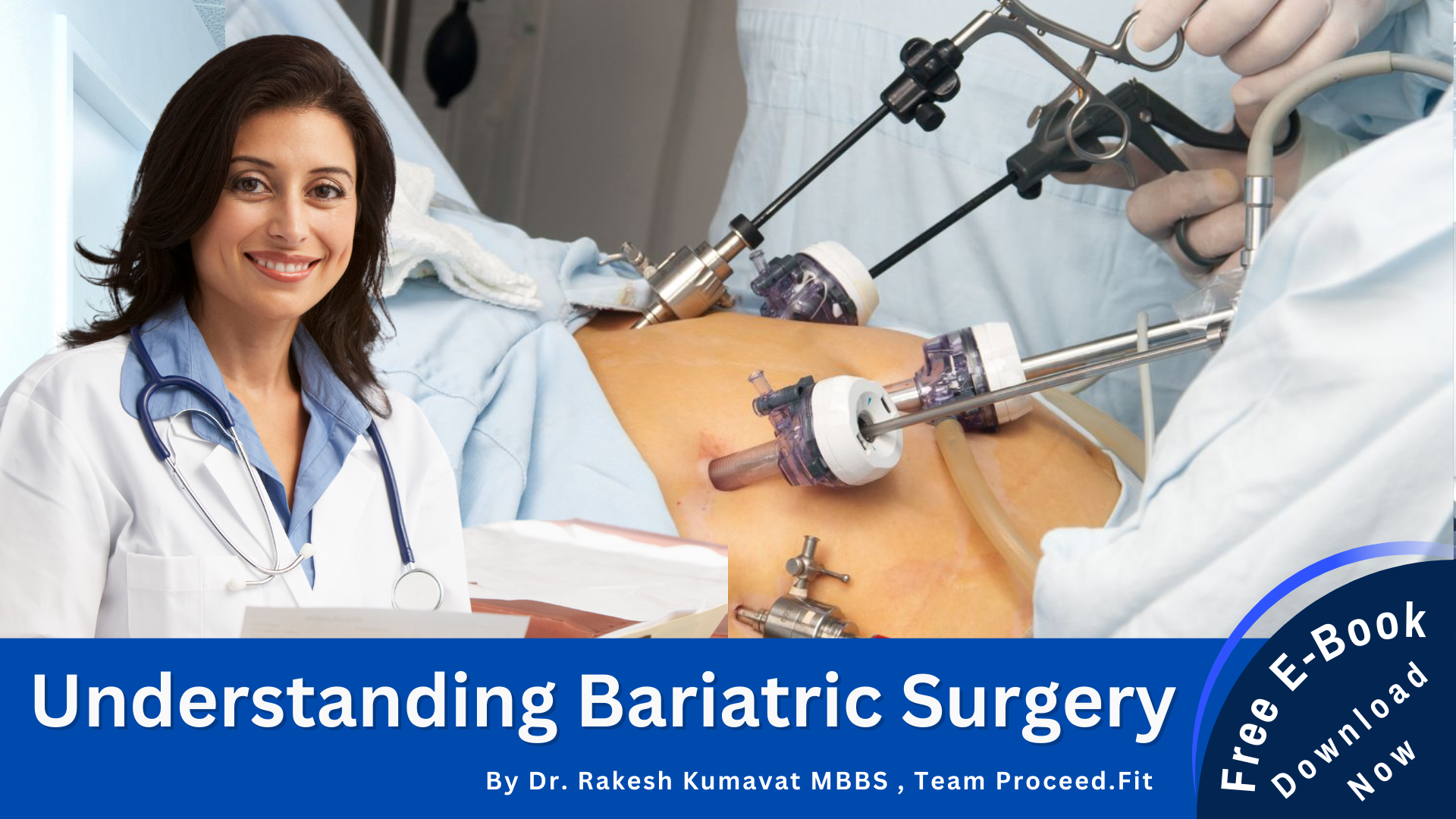
Understanding BariatriC Surgery
Healthcare Oct-04-2024 0
Have you long been struggling to get rid of those additional weight gain? Attempted a selection of diet regimens and also exercises, but all in vain? Well, if you prepare to go with the resection to get rid of that excess body weight, bariatric surgical procedure will be a viable choice for you. This could be best choice for those who are morbidly obese.
Have you been struggling to shed that extra weight for a long time? Tried various diet regimens and exercises, but all in vain ? If you're considering a more intensive approach to eliminate excess body weight, bariatric surgical procedure could be a suitable option. It's an excellent choice for individuals dealing with morbid obesity.
For those seeking to understand the basics of bariatric surgery and its implications, we have crafted this series of articles. We shall explain the method by which bariatric surgery aids in weight loss and promotes a healthier lifestyle.
Obesity
Definition: Obesity is a chronic disease characterized by a pathological increase in body weight due to adipose tissue.
Causes of Obesity
- Nutritional-constitutional (primary) - This accounts for 90-95% of all cases, and is a consequence of lifestyle - reduced physical activity, consumption of fatty, high-calorie foods, foods high in sugar and refined carbohydrates.
- Endocrine obesity (secondary) - its cause can be endocrine pathology (decreased thyroid function, hypogonadism, “empty” sella syndrome, pituitary tumors, Cushing’s syndrome, etc.), genetic defects in the structures regulating fat metabolism, mental illness. Lifestyle also plays a significant role in the pathogenesis of secondary obesity. This group also includes hypothalamic obesity associated with the presence and treatment of hypothalamic tumors.
- Causes of obesity in children : develops due to genetic predisposition in combination with perinatal, environmental, psychosocial and dietary factors. However, the main reason for obesity is that a child consumes more calories than he expends in energy.
Points to remember
- First of all, if a person is obese, the work of the cardiovascular system is negatively affected, this is because the heart of an obese person has a so-called “transverse position”, which occurs because the the diaphragm is located higher and the heart has a larger size than a slim person.
- In the case of obesity, fat deposition also occurs between the layers of the pericardium, which becomes a sheath, and fat, entering the fibers of the heart, gradually causes degeneration of these muscles.
- According to modern medical statistics, individuals with obesity are significantly more prone to heart disease-related deaths compared to those with normal or low weight.
- The development of this disease is the direct cause of the presence in the human body of problems associated with improper fat metabolism and an increase in total cholesterol and triglycerides in the blood. And, ultimately, atherosclerosis can cause a stroke or myocardial infarction in an overweight person.
- Most people who have problems with excess weight or obesity also have hypertension.
- According to medical research, the average life expectancy of people with excess weight problems is reduced by about 10-13 years, and, of course, the quality of life suffers greatly.
What is Bariatric Surgery?
Bariatric surgery is a set of surgical procedures intended to help people who are severely obese lose weight. The main groups for whom these interventions are advised are those with a body mass index (BMI) of 40 or higher, or those with obesity-related health issues and a BMI of 35 or higher. The development of bariatric surgery represents a crucial turning point in the world of medicine by providing a game-changing option for people struggling with excessive weight and the related health problems.
During the mid-20th century, bariatric surgery gained popularity as a treatment for extreme obesity and its associated health issues. The jejunoileal bypass, performed in the 1950s, was the initial reported bariatric treatment. The goal of this strategy was to restrict the absorption of calories by rerouting the small intestine. However, this method lost favor due to serious consequences such as malnourishment and anomalies in metabolism.
Throughout time, advancements in surgical techniques resulted in safer and more efficient surgeries. The invention of the Roux-en-Y gastric bypass in the 1960s was one of the most significant turning points in the history of bariatric surgery. Significant weight loss was achieved as a result of this treatment, which involved shrinking the stomach pouch and reorganizing the small intestine. This lowered food intake and altered digestion led to the desired outcome. Even now, one of the most popular bariatric procedures is the Roux-en-Y gastric bypass.
A significant milestone in bariatric surgery emerged with the introduction of the adjustable gastric band in the 1980s. The upper portion of the stomach was made smaller with the use of an inflatable band, which reduced the amount of food that could be eaten. Changes in tension could be made to the band, making it a less invasive and reversible option for weight loss. But over time, its popularity waned due to issues with long-term efficacy and other side effects.
The landscape of bariatric surgery underwent a complete transformation in the late 1990s with the introduction of laparoscopic or minimally invasive procedures. The risk of complications was decreased, recovery time was shortened and surgical trauma was lessened with laparoscopic techniques. To reduce hunger and limit food intake, procedures like the laparoscopic sleeve gastrectomy—which involves removing a sizable portion of the stomach—have become more popular as either an efficient stand-alone surgery or the first step in a staged weight loss regimen.
With ongoing improvements in surgical methods and a growing comprehension of obesity as a multifaceted illness, bariatric surgery is now much safer and more effective. Comprehensive pre-operative evaluations and post-operative care have evolved into essential components of bariatric care, working in tandem with surgical innovation to guarantee patients' long-term success and improved outcomes.
Deciding to have bariatric surgery is a serious matter that usually requires consultation with multiple professionals. To ascertain whether they are eligible for surgery and prepared for it, patients go through a rigorous evaluation process that includes physical, psychological, and nutritional testing. It is imperative to comprehend that bariatric surgery serves as a tool to aid in weight loss and enhance general health rather than an all-encompassing remedy.
A successful post-operative journey necessitates lifestyle adjustments, dietary adjustments, and continued support.
Bariatric surgery has benefits beyond just helping people lose weight. Numerous patients who have these operations report notable improvements in conditions linked to obesity, including type 2 diabetes, hypertension, sleep apnea, and joint issues. After surgery, this observed metabolic improvement frequently happens quickly, which lowers the need for medication and improves quality of life.
But it's important to recognize that there are possible risks and complications associated with bariatric surgery, just like with any surgical procedure. Complications such as infections, bleeding, malnutrition, gallstones, and, in certain situations, the necessity for additional surgeries due to complications or insufficient weight loss are some of the associated risks.
To optimize results and minimize risks, ongoing research has focused on improving patient selection criteria, exploring innovative procedures, and refining surgical techniques. Furthermore, the long-term consequences of bariatric surgery are receiving more attention. These effects include how the procedure affects quality of life, mental health, and the ability to maintain weight loss over time.
Bariatric surgery is becoming more widely accepted as a viable option for individuals who are suffering from severe obesity due to its demonstrated effectiveness in achieving major weight loss and improving conditions related to obesity. The advancement of bariatric surgery and the endeavor to comprehend obesity as a multifaceted medical condition serve as testaments to the ongoing dedication of healthcare providers in offering effective solutions to patients grappling with this challenging medical problem.
Conclusion:
Bariatric surgery is a game-changer for those struggling with extreme obesity and related health issues. It is a significant turning point in the history of medicine. Improvements in pre-operative assessment and post-operative care, combined with the development of surgical techniques, have made these procedures much safer and more effective. Bariatric surgery can be a life-changing procedure for many, even though it is not a one-size-fits-all approach and carries some risks. It can help with significant weight loss and frequently result in the improvement or resolution of comorbidities related to obesity. In order to improve bariatric surgery's long-term results and support for people looking to live healthier, more fulfilling lives, ongoing research and an integrated approach are shaping the field.
Contributed by Dr. Rakesh Kumavat (MBBS)
Team Proceed.Fit
Disclaimer: The information provided in this article is for general informational purposes only. It is not intended as a substitute for professional medical advice, diagnosis or treatment. For any concerns about your health or you are experiencing symptoms, it is important to consult with a healthcare professional. They will be able to assess your specific situation and provide you with personalised advice and treatment based on your symptoms, body type, allergies (if any), existing medical conditions etc. It is always better to consult with a healthcare professional before making any decisions about your health. By accessing this article you agree with our terms and conditions - https://proceed.fit/frontend/terms_conditions.
https://www.youtube.com/watch?v=oPTWLjIoTFE


_.png)
_2.png)


_(1)_1.png)
_1.png)
_1.png)
_(1)_1.png)











.png)

Sorry! You can't submit a comment without logging in first. If you have a general question, please email us at contact@proceed.fit
0 Comments